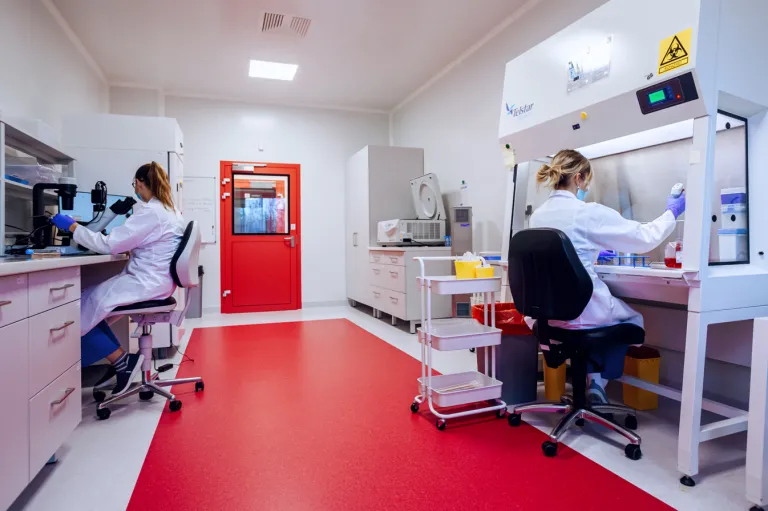Couples planning a pregnancy try their best to prepare for this special time. The growing awareness of the public means that the period of preparation for pregnancy is often under the care of various specialists, not just gynecologists. How can a woman prepare for pregnancy? What tests are worth doing before getting pregnant?
Preparing for pregnancy- a visit to the gynecologist
Preparing for pregnancy should start with a visit to your gynecologist. This is because it is very important to do research, among other things. cytology, especially if it hasn’t been taken in a long time. In addition, during the gynecological examination and ultrasound, it is possible to exclude or identify any changes in the structure of the reproductive organs that could make it difficult to get pregnant or later maintain a pregnancy. If a gynecologist determines the presence of cervical polyps, it may be necessary to remove them even before pregnancy. However, it is important to remember that uterine myomas, for example, do not always impede conception and do not need to be removed in every case. The performance of the treatment depends on their size and type.
The gynecologist at the pre-pregnancy visit may also order blood tests that will provide information on whether iron or thyroxine supplementation, for example, is necessary. In addition, during the visit, it’s a good idea to discuss healthy lifestyle issues with your doctor, as well as address any concerns you may have about preparing and trying for a baby.
How to prepare for pregnancy- blood tests
A gynecologist at a pre-pregnancy visit may write a referral for blood and urine tests. They are not mandatory, but they provide a picture of a woman’s overall health and allow for possible interventions such as the aforementioned supplementation or additional tests. Most often, doctors advise performing before pregnancy:
- Blood morphology
- Blood group test (the test will have to be repeated 2 times before delivery)
- Antibody levels for toxoplasmosis, rubella, cytomegalovirus, hepatitis or HIV
- TSH and FT3 and FT4 (thyroid hormones) levels
- Fasting glucose levels
Why are these particular studies mentioned? Hypothyroidism, manifested by, among other things. high TSH levels, can often make it difficult to get pregnant. If the fasting glucose test comes out abnormal, the next step is to perform a glucose load test (OGTT). In the absence of antibodies to, for example, rubella, one may choose to be vaccinated. It is a live vaccine, so you should be vaccinated before becoming pregnant.
Such screening, although not mandatory, provides the doctor with a lot of valuable information and allows him to implement appropriate management even before pregnancy. This has a positive impact on its later course and reduces the risk of complications for both the mother-to-be and the baby.
Supplements before getting pregnant
Many women thinking about pregnancy wonder whether, in addition to maintaining a healthy lifestyle, a well-balanced diet and the right amount of physical activity, they should also start vitamin supplementation. There are many multivitamin preparations available on the market, but according to PTGiP recommendations, they are not necessary for women trying to have a baby and who are pregnant. According to current standards, every woman of childbearing age, let alone one planning a pregnancy soon, should take folic acid. It is essential for the proper development of a child’s nervous system and significantly reduces the risk of neural tube defects such as spina bifida. The dose of folic acid should be adjusted according to the history of, among other things. previous miscarriages. However, the most common is 0.4 mg per day.
The diet, both before and during pregnancy, should be rich in products containing DHA acids, which are found, among other things. In marine fish. In addition, if a woman suffers from anemia, iron supplementation may be necessary. It is always best to consult the use of supplements with your doctor, as preparations contain different amounts of elements and do not always follow the recommendations of scientific societies.
Vaccinations before pregnancy
During pregnancy, you cannot be vaccinated with live vaccines. Safe and recommended vaccinations for pregnant women are influenza and pertussis. So if a woman does not remember whether she has been vaccinated for rubella, for example, in the past, or whether she has contracted it, it is worthwhile to test the level of antibodies to this infectious disease even before pregnancy. If they come out low, and you are just planning a pregnancy, it is safe to get vaccinated. This avoids infection during pregnancy, thereby exposing the baby to possible complications, which are particularly dangerous if infection occurs in the first trimester. After rubella vaccination, wait at least one month before getting pregnant.
Visit to phlebologist before pregnancy
Problems associated with varicose veins of both the lower extremities and the vulva or anus are a common affliction of pregnant women. However, many of them do not realize that these problems could have been prevented even before pregnancy. To check the condition of your vessels and the risk of insufficiency, it is advisable to go for a consultation with a specialist phlebologist while you are still trying for a baby. During the pre-pregnancy visit, the doctor will perform a Doppler ultrasound of the vessels of the pelvis, abdomen and lower extremities and assess the viability of the venous vessels. If abnormalities are detected, he may suggest surgery, but will also recommend how to care for the venous system during pregnancy to minimize the risk of varicose veins.
Consultation with a urogynecological physiotherapist
After visiting a phlebologist and taking care of the vessels, it is next worthwhile to see a urogynecological physiotherapist. Many women choose to have such a consultation only before or after childbirth. They do not realize that the pelvic floor muscles are worth taking care of even before pregnancy. The specialist will also advise what exercises will prepare a woman’s body for pregnancy and childbirth. In addition, it will help equalize tensions, possible asymmetries, as well as improve blood circulation or, for example, relieve pressure on the diaphragm. As a result, the mother-to-be will have fewer discomforts during pregnancy, and the baby will be able to grow peacefully in the uterine cavity.
Rate this article:











